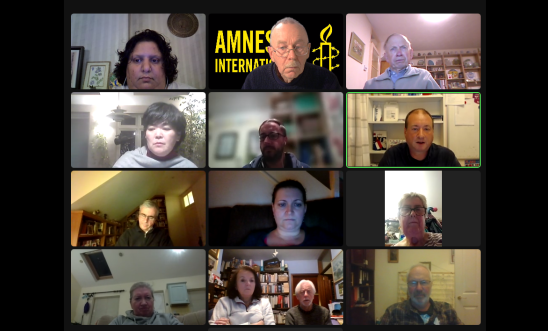
Mark Farmaner from Burma Campaign UK - 7 November 2022 Meeting Highlights - Sutton Amnesty

We were delighted to welcome Mark Farmaner who gave a wide-ranging and insightful talk on the situation in Myanmar based on his first hand experience. Mark is a director of the Burma Campaign UK and has visited and traveled extensively within Burma. Mark started with some history.
A short post-war, post-colonial period of democracy, unifying the various ethnic groups and holding the country ended with a military coup in 1962. A further coup in 1988 was shortly followed by the house arrest of Aung San Suu Kyi (ASSK - subsequently the focus of international human rights concerns relating to Myanmar and also winner of the Nobel Peace Prize).
In 2010 there was the start of a 'reform process' and the National League for Democracy (the party which ASSK had co-founded) took part and led the Government from 2015. In practice though the Government had no power over the military or the police. The latter exploited the international goodwill arising from the apparent reforms (which led to sanctions being lifted and debt written off). Meanwhile it conducted a programme of genocide against the Rohingya Muslim population. ASSK failed to take any action to protect the Rohingya people, so tarnishing her reputation.
In 2021 the military, perhaps unsettled by the results of the 2020 elections in which ASSK's party did very well and the paramilitary party very badly, took back full control in what was yet another coup. This led to significant protests and the killing of about 2000 protesters.
Central Burma is essentially Buddhist but the country as a whole is ethnically diverse. Younger people in the regions took the fight to the military. Subsequent to the seizure of control in 2021 the military have arrested a number of opponents so that approximately 16,000 are in jail (compared to 2,000 before the 2021 power grab). Treatment of prisoners and groups seen as a threat to the military has been appalling, involving torture, sexual violence and confiscation of homes. Pictures of people 'post violence' have been put on television and in the papers.
The military have used air power (often at night) with hundreds of air strikes carried out. They have bombed churches and mosques and recently blocked roads to prevent access to medical treatment for those bombed. A total of 1.2 million (compared to a Burma population 55 million) have been forced to leave their homes as a result of the air strikes. Mark referenced the report by Amnesty International published the previous week (https://www.amnesty.org.uk/press-releases/myanmar-investigation-reveals-aviation-fuel-supply-chain-linked-war-crimes). This had focussed on the supply of aviation fuel to the regime, which was used to support the air strikes. As a consequence of evidence provided by Amnesty, Puma Energy had pulled out of Burma. There was still a challenge in stopping supplies from Russia and China. Mark commented that the British Government had done a good job cutting off funding to Burma.
Burma Campaign UK works in Myanmar’s regional communities supporting health clinics treating amongst other things, horrific injuries from landmines. Mark spoke glowingly of superb, well-organised and brave local 'Civil Society' groups. There was a strong local belief in the importance of schools, respect for women, health clinics and organic farming programmes and a drive to support communities.
Mark also spoke about the difficulty of obtaining press coverage for the plight of people in Burma. The BBC has no direct coverage of Burma and most papers' nearest base is Tokyo. The best source is therefore the 'wire services' (Reuters etc.). He spoke positively of the Sutton & Cheam MP Paul Scully, whose father was from Burma. He had attended all party meetings on Burma and would talk to the Foreign Office behind the scenes. He was good at asking 'open questions'.
There has been much 'hate speech' in Burma against the Rohingyas, who were deemed to be Bangladeshi. Mark spoke about the waves of attacks in 2012 against the Rohingya Muslims which were expanded to Muslims generally. The international community wanted to tell a positive story about Burma so ignored these. He believed ASSC backed this repression calling it an issue of 'rule of law and immigration'. He believed that, had she spoken out, she could have made a difference.
Following the 2021 coup and the consequent 'mask slipping', international opinion moved against the military regime. The Gambia has taken a case to the International Court of Justice on the treatment of the Rohingya people. The UK takes the lead on research for sanctions against Burma with the US/Canada/EU following. It is important that any sanctions are targeted on the regime and not the people. He recognised that the FCDO has been hollowed out and has limited resources. While the Myanmar embassy in London is now occupied by the military regime, they are not invited to meetings with the British Government.
Mark also recommended his wife's book (Little Daughter by Zoya Phan - https://www.amazon.co.uk/Little-Daughter-Memoir-Survival-Burma/dp/1847394264) for a first hand account of life in Myanmar.
0 comments